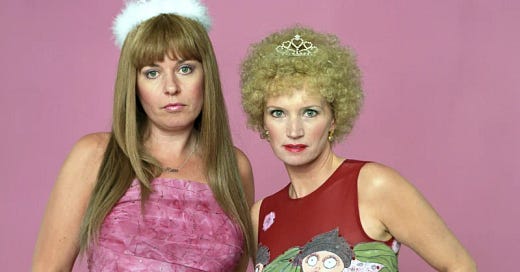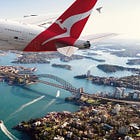2002: Collision course
Terrorist attacks. Killer crocodiles. Great hair. A weird and uneasy year.
After a frenetic final three months of 2001, a couple of events opened the new year.
I don’t recall Australian Prime Minister John Howard touring Ground Zero at the end of January, although I must have been there: that’s a bread and butter event for any foreign correspondent, especially one based in New York. I imagine he did the usual solemn nodding and muttering and whatnot, no doubt again committing the country to fight any where, any time, no matter how fake the pretext.1
Ironically, I do distinctly recall a vastly more important event two weeks later: Australia’s first gold medal in Winter Olympics history. In a triumph of being in the right place at the right time, Stephen Bradbury was dead last in the 1,000-metre men’s short-track speed skating when, on the final bend, the other four finalists all crashed out. Last man standing, I guess, in the perfect mirror of Howard’s career.
But this was a tough year. The Bush administration spent 2002 pretending Saddam Hussein posed a dire threat to the United States and the world, in some bizarre effort by Dubya to prove his manliness to his father. I spent the year enduring long days, hitting the phones in the morning, snoozing in the afternoon, then working until 3am or so to hit the first-edition deadline in Sydney. In the US summer, I finagled three weeks off and went rock climbing in the wilds of Wyoming, was asked if I’d like to become an outdoor instructor, decided whatever I was doing with journalism was more important, and returned to the city about 20lbs lighter, stronger than ever, and ready to reinvigorate my life.
All the while, Australia rocketed on without me.
The worst drought in a century gripped the country, and I remember my parents having to limit showers to a couple of minutes, simultaneously collecting water in Tupperware containers so they could keep the pot plants alive. More than twenty years later, how are we doing? Record temperatures every year, and the Australian Bureau of Meteorology has a new map color (“incandescent purple”) to signify temperatures of more than 50 degrees Celsius (122 degrees Fahrenheit). Nice work, boomers.
One event related to Australia did make headlines here: the Bali bombings. Coming barely a year after 9/11, the terrorist attacks that killed a total of 202 people—88 of them Australian—temporarily dominated the headlines in the US, and were jumped on by George W. Bush as justification of the need to strike against Al Qaeda (“I’m concerned about our homeland,” he declared).
My take on life in Australia in 2002 is it was weird and uneasy, just as it was here in the US. I mean, nothing good can come of a year which saw the death of Ruth Cracknell and my Canterbury Bulldogs slammed for breaching the salary cap, relegated from being minor premiers to wooden spooners.2 At least I can take heart in Collingwood losing the AFL grand final, given Collingwood supporters remain—I’m reliably informed—as obnoxious as ever.
But here’s a question: what the heck persuaded the great David Wenham, fresh off his Diver Dan turn in the great SeaChange, and the always fantastic Magda Szubankski to think appearing in Crocodile Hunter: Collision Course was a solid career move? I can only imagine they were persuaded by a collision course with their checking accounts, since this is the plot: “In outer space, a United States-owned satellite blows up and one of the last remaining pieces, a beacon, is sent hurtling towards Earth. The beacon lands in Australia, only to be swallowed by a large crocodile. At the CIA, Agent Buckwhiler and Deputy Director Reynolds reveal that, in the wrong hands, the beacon can change the axis of power in the world.”
Mmmm-kay. Maybe I don’t miss home so much after all.
On the bright side, the year also saw the debut of Kath & Kim, which my brother turned me onto and is reliably hilarious, insightful, and so damn Australian it hurts. Actually, when I first watched it I had a solid dose of cultural cringe; that sense it played to the worst stereotypes of home—the ones that had Americans continually ask me if I “threw shrimp on the barbie” (they’re prawns, idiot). But in the way all great comedies shine the truest and smartest light, Kath & Kim both made me proud and laugh. A lot.3
The only other moment of hilarity? The marriage of Andrew Peacock to former Texas beauty queen Penne Percy Korth. It’s not funny because they met when Peacock was the Australian Ambassador to the United States and she was the US Ambassador to Mauritius. It’s funny because any mention of the helium-coiffed Peacock reminds me of Paul Keating’s reaction when Peacock became leader of the Opposition for the second time: “Can a soufflé rise twice?”
No, it can’t. And by the end of 2002, with talk already turning to what I may do on my return to Sydney the next year, it was already becoming clear this particular soufflé was being asked to do just that by returning to the role I held before I left. I was on a collision course, just without the dodgy movie plot.
About this series: Australian almanac
This is part of a series of articles examining what the heck has happened in Australia in the 23-odd years I’ve been living in the United States. The introduction to this series is here, and related posts below:
More on that, and the debasement of Colin Powell, in 2003.
I’ve no idea why I supported Canterbury. I didn’t know rugby league existed until moving to Brisbane in 1987, but a quick glance at the list of NRL premiers makes my allegiance obvious: they won the premiership the following year. Nothing like a kid latching onto whatever team is top at any given point in time.
It’s no surprise the US spin-off failed—it just never had the heart of the original, and the fact American comedy is generally far more obvious and less subversive didn’t help.




